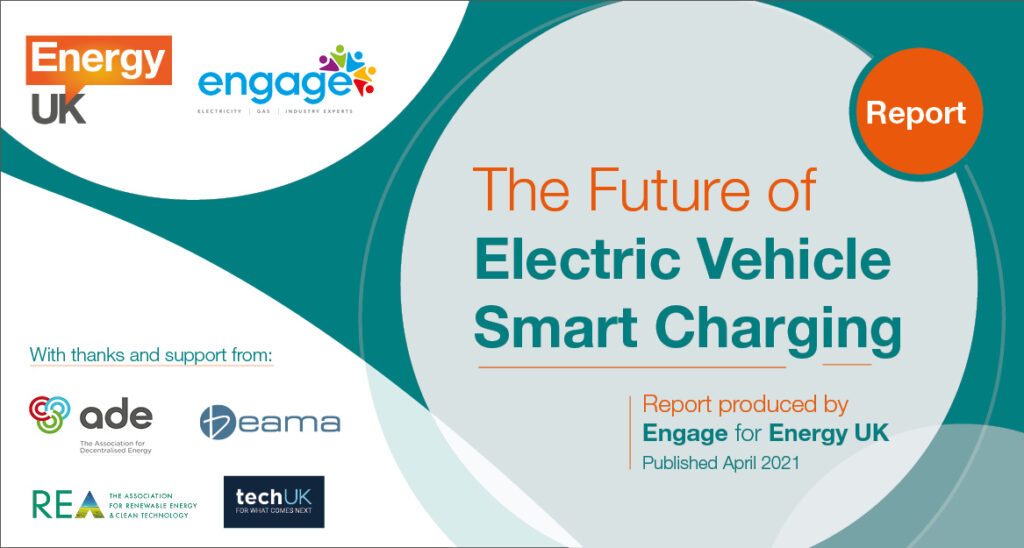Mandating the Smart Data Communications Company (DCC) as the enduring solution for smart charging is “not the way to go” according to a new Energy UK report.
The report – produced by Engage Consulting and backed by the ADE, BEAMA, the REA and techUK – explored a variety of smart electric vehicle (EV) charging options and the benefits and protections they will need to provide consumers and the energy system.
While the government has indicated its preference for using the smart meter network in the future to facilitate smart charging, Energy UK said its report shows “clear opposition” to this from organisations across the energy, automotive and chargepoint operator industries, with 20 organisations interviewed.
These interviews revealed that some interviewees felt that the smart meter system does not have the capability to respond fast enough to enable future participation in flexibility markets such as Fast Frequency Response.
Some interviewees also had concerns that using the smart meter system would stifle innovation and delay or prevent new market product offerings going forward, with this based on the complexity, slow pace and cost of smart meter change and governance arrangements, which require SEC Modification Proposals to be submitted and assessed before being voted upon by the Change Board and possibly going forward for determination by the Authority.
There was also an incorrect perception from interviewees that currently smart meter systems only communicate twice a day whereas chargepoint operators communicate down to granular levels of seconds.
The report outlined how the government has asked the industry to provide credible alternatives to using the smart meter network, but in order to design innovative new products the industry needs to know the requirements in greater detail, particularly around cyber security.
Many interviewees were concerned that enforcing the smart meter security requirements at a device-level, for example, requiring all EV charge point devices to go through the Smart Metering Commercial Product Assurance regime, will add significant cost, and prevent or restrict innovation in the market as a whole.
In looking at other solutions, the report explained the need to avoid Great Britain-centric solutions due to the market for EVs being global, adding that solutions should be sought that work for both the domestic and non-domestic sector and priority should be given to approaches that increase rather than restrict functionality. Additionally, companies that are pushing the limits of technology should be allowed to continue to do so in order for smart charging to remain synonymous with innovation, customer-focus and excellent user experience.
One solution looked at by the report was a hybrid system, which could combine day-to-day control via non smart meter systems with a layer of supervisory control via the smart meter system in exceptional circumstances, for instance serious grid imbalance, therefore ensuring the protection needed for networks and customers.
It pointed to industry trials such as My Electric Avenue and Electric Nation, which it said had shown that demand control is possible “and effective” using chargepoint operators to facilitate control of demand at the EV chargepoint without using the smart meter system.
Emma Pinchbeck, chief executive of Energy UK, said that the research shows that there are a range of smart charging at home options that are secure, unlock innovation and that deliver for customers, with industries in the EV market needing government to “listen to their concerns and recommendations, and to clearly lay out their smart charging system requirements so we can build and deliver it”.
Whilst Energy UK was clear that using the smart meter network for smart charging was not its preferred option, it added that it recognises that smart metering infrastructure will act as a “building block” for many smart energy offerings and that having invested so much in this infrastructure, the government is in a “difficult situation” where it wishes for it be extended into other markets.
In response to the report, Angus Flett, CEO of the DCC, said the company disagrees “with the thrust of the report”.
He said that benefits of using the smart meter network would be high standards of cybersecurity, interoperability that would avoid consumers being trapped in poor deals and secure load control to balance the grid.
“Far from being some kind of rival to energy companies and chargepoint providers, the DCC network is a common enabling platform for competition, innovation and consumer choice which already exists, and is capable of supporting private EV charging,” he added.






